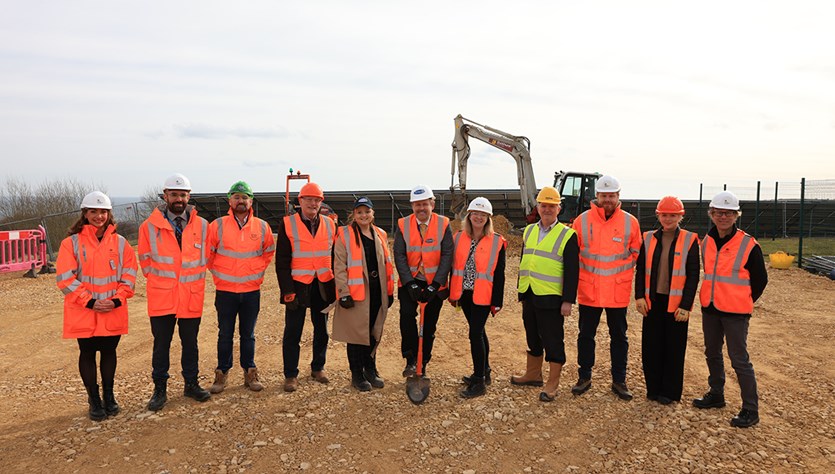Construction has officially begun on a landmark large-scale mine water heat project, building on our ongoing efforts to harness geothermal heat from disused coal mines. By utilising water already being pumped to the surface, this project marks a crucial step forward in expanding renewable heat solutions across former coalfield areas.
The Energy Centre being built directly next to the Mining Remediation Authority’s Dawdon Mine Water Treatment Scheme in County Durham, will tap into the mine water already being treated there. The mine treatment scheme will now provide heat for a new housing development as well as protecting a vital drinking water source.
Seaham Garden Village is a new mixed-use sustainable community located to the south of Seaham. The Garden Villages comprises 1,500 homes, a new primary school, village centre and innovation hubs. The Garden Village will be built over the next 10 years.

Representatives from Vital Energi joined members of the Mining Remediation Authority, Severn Trent Services, Durham County Council, Karbon Homes and Esh Group gather to celebrate the beginning of the project.
The district heat network project has been led by Durham County Council, with the Mining Remediation Authority spearheading the development of the mine water heating initiative. Multiple organisations have been involved including Karbon Homes, which is now set to provide 750 affordable homes on the site and has led the way in adopting the mine water heat technology. Vital Energi has been appointed to design, build and operate the low-carbon system. They will run the district heat network for the next 40 years.
The project has benefited from a grant from the Government’s Heat Networks Investment Project which has enabled the project to be delivered.
Seaham Garden Village will offer a thriving, sustainable new community on Durham’s heritage coast and play a vital role in local growth. The state-of-the-art energy centre will capture the geothermal heat from the warm mine water, which remains at a stable underground temperature. This heat will be upgraded to domestic heating levels via a heat pump, delivering low cost and low carbon heat to new Karbon homes.
The Dawdon scheme began treating mine water in 2009 and the Mining Remediation Authority has been researching the possibility of ‘bolting on’ the heat feature to these treatment sites as part of their pioneering work in the geothermal arena.
This new development follows the success of the Gateshead scheme, the UK’s first large-scale mine water heat network, which began providing heat to homes and businesses in March 2023, as well as another pioneering privately funded scheme nearby at Lanchester Wines warehouses. Unlike Seaham Garden Village, the Gateshead projects used boreholes, which were drilled up to 150 metres underground to tap into water in disused mines.
“With over 80 mine water treatment schemes across the UK, we see great potential to deliver dual-purpose facilities that protect water supplies and generate renewable heat,” Mr. Bond added. “Whether accessing mine water heat via our treatment schemes or boreholes the Mining Remediation Authority are proud to offer innovative ways to reduce carbon emissions by repurposing the amazing UK coal-mining heritage.”
Construction work to build the energy centre and connect the houses at the Seaham Garden Village development is expected to take around four months.
Cllr Mark Wilkes, Durham County Council’s Cabinet member for neighbourhoods and climate change, said: “We are delighted to have started work on what will be the UK’s first large-scale mine water heat project that uses a mine water treatment scheme, right here in County Durham.
“This innovative project will have significant environment benefits – making use of currently untapped heat to keep houses warm, and potentially a school and innovation hubs, and in doing so avoiding the need to use non-renewable sources of energy.
“The affordable properties will also provide a welcome boost to county residents looking to get on the housing ladder; while the prospect of more homes, a school and innovation hubs in the future will attract people looking for somewhere to live, families and those seeking work.
“A lot of planning has gone into this in recent years involving a number of organisations and it’s therefore really exciting to have all the necessary agreements in place and work starting on the ground.”
Paul Fiddaman, chief executive at Karbon Homes, added: “It’s fantastic to partner with Durham County Council and the Mining Remediation Authority to connect our homes to this innovative low-carbon heat system.”